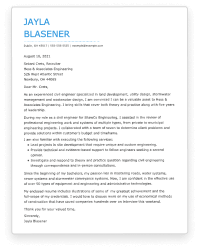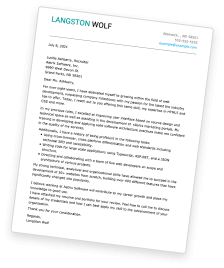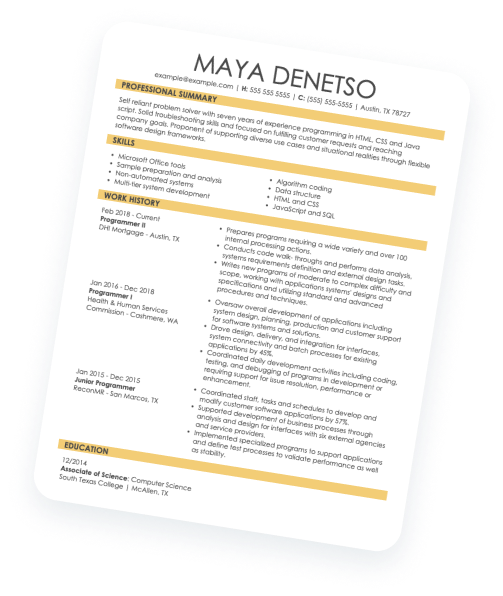Dialysis Technician Resumes: Overview
As a dialysis technician, you play a crucial role in providing life-sustaining treatment to patients with kidney failure. Your responsibilities include operating dialysis machines, monitoring patients, and collaborating with healthcare teams.
Dialysis technicians must be proficient in operating dialysis equipment, be attentive to detail, have strong communication skills, have empathy, and be ready to handle emergencies calmly and professionally.
Dialysis technicians are needed in several different healthcare environments, including:
- Hospitals
- Dialysis Centers
- In-Home Patient Care
- Nursing Homes
- Rehab Facilities
Creating an impressive resume is the first step to getting your next job as a dialysis technician! Use our website’s expertly designed resume examples and downloadable templates to build a resume that sets you apart from the competition!
Dialysis Technician Resume: Choose a Format
To create a stellar dialysis technician resume, you first need to choose a resume format.
Selecting the best resume format to present your work experience, skills, and abilities is crucial to landing your dream job.
There are three formats that a dialysis technician should consider: chronological, functional, or combination. Let’s take a closer look at the benefits and drawbacks of each format to help you decide!
Chronological Resumes for Dialysis Technician
A chronological resume format is the most common choice. It will be familiar to most employers and is highly recommended by career experts.
Chronological resumes are also highly compatible with automated applicant tracking systems (ATS), which may increase your chances of having your resume reviewed by a hiring manager.
A chronological format showcases the progression of your work history in the dialysis field. It is a great choice for an experienced dialysis technician because of its emphasis on the job experience.
A chronological resume lists your previous jobs, including your job title, employer’s name and location, and the dates you were employed.
Then, under each job entry, you detail your job responsibilities and achievements in concise, bulleted sentences.
You can tailor these sentences to each job you apply for to highlight your most relevant qualifications.
Functional Resumes for Dialysis Technician
A functional resume format is ideal if you want to emphasize your skills and qualifications rather than your work history. It can be a good choice for someone just beginning their career in dialysis.
In a functional resume, you provide details about your relevant skills, training, and other qualifications and put a minimal amount of information about your previous work experience.
Unfortunately, using this format can have some drawbacks. Employers tend to place a high value on work experience and may not be familiar with a functional resume format.
It is also important to note that this format is not ATS-friendly, as automated systems are usually programmed to scan for a detailed work history.
That doesn’t mean you shouldn’t use a functional resume. Just be aware of its limitations. If you lack relevant experience, this may be the right format to focus on your technical proficiency, communication skills, and attention to detail.
Combination Resumes for Dialysis Technician
Your third choice is a combination resume format. This unique format combines elements from both chronological and functional resume formats. It allows you to showcase your work history while emphasizing your skills equally.
In a combination format, you list your skills and qualifications prominently near the top of your resume, followed by a detailed work history.
It is an excellent choice for a dialysis technician with limited experience or transitioning from a different career. It is also suitable for someone with gaps in their employment history.
Choosing a Resume Format
Choosing the right resume format is an important step in the writing process. Consider your experience level, skills, and qualifications to decide which format will help you make the best first impression.
When in doubt, a chronological resume is always a safe bet. Even if you don’t have relevant work experience, you can tailor each section of your resume to highlight transferable skills and demonstrate your ability to do the job.
For example, if your previous work involved customer service, that may have prepared you for working with patients in a friendly and professional manner.
Skills like attention to detail, keeping accurate records, communicating with team members, and maintaining a clean and safe work environment can apply to many different careers and will demonstrate your ability to do the job.
How to Write a Dialysis Technician Resume
Once you have chosen your resume format, you can start writing your resume content. This process is fairly straightforward, but don’t worry– we’ll walk you through it in this step-by-step guide to writing a dialysis technician resume!
Your resume will consist of five key sections:
- Contact Information
- Resume Summary or Objective Statement
- Work History
- Skills
- Education
Once you have completed those sections, if space allows, you can consider additional sections like achievements, professional memberships, or certifications to make your resume stand out.
Now, let’s look at how to craft each section of your dialysis technician resume to grab the attention of hiring managers!
Contact Information
First, you will provide your contact information so potential employers can contact you.
Your contact information should include your full name, city, and state where you live, email address, and phone number.
Place this information at the top of your resume where it is easy to find, and format it so it is easy to read!
Depending on the resume template you choose, your contact information may look something like this:
Jane Jones
Colorado Springs, CO
JJones@fake.mail.com
555-555-5555
Ensure your contact information is up to date and free of errors. It should stand out on your resume, but don’t waste too much valuable space on the page.
Summary or Objective
Next, you will write a brief but compelling introduction to your resume. You can choose either a resume summary or an objective statement format for this section of your resume.
A resume summary is a concise overview of your dialysis tech experience and the most relevant skills and qualifications. This summary should be no more than 2-3 sentences long and should be customized for each position you apply for.
Here’s an example of a well-written resume summary for an experienced dialysis technician:
“Dedicated dialysis technician with over 5 years of hands-on experience providing life-sustaining treatments to patients with kidney failure. Proficient in operating and maintaining dialysis machines, monitoring patients during procedures, and collaborating seamlessly with healthcare teams. Adept at handling emergencies with composure while delivering compassionate care.”
On the other hand, an objective statement is better suited for someone just starting out as a dialysis technician. A well-crafted objective statement demonstrates your enthusiasm for the position while emphasizing your skills and abilities.
For example, an objective statement for a recently graduated dialysis technician might say:
“Recently certified dialysis technician eager to apply comprehensive coursework and hands-on training to operate dialysis machines, monitor patient responses, and contribute effectively to healthcare teams. Seeking an entry-level position providing exceptional patient care while learning and growing in the dynamic field of dialysis.”
Whether you choose a summary or an objective statement, this introductory paragraph is the perfect opportunity to customize your resume to match the job you are applying for.
Using keywords from the job description can help the ATS select your resume for further consideration.
Work History
Next, you will write your work history section. Again, you should tailor this section to the job you want.
Read the job description carefully, and make sure your work history details your most relevant qualifications for the job.
In this section, you will list your previous jobs in reverse chronological order. Start with your most recent job and work backward. Each job entry should include:
- Job Title
- Employer’s Name
- Employer’s Location (City and State)
- Start and End Dates of Employment
Then, underneath each job entry, provide details using bullet points to outline your responsibilities and achievements in each role.
Use strong action verbs like prepared, educated, observed, assisted and cared for to grab the attention of potential employers.
For instance, you might write:
“Monitored and adjusted dialysis machines, ensuring accurate treatment delivery and patient safety.”
Using numbers and percentages to quantify achievements will demonstrate your impact in previous roles and help you stand out from other candidates.
For example, you could say:
“Adhered to infection control standards of practice and suggested improvements to reduce infection risk by 30%.”
Or:
“Provided support and care for up to 8 patients daily during dialysis procedures, educating patients and caretakers on proper pre and post-treatment care.”
Remember to use industry keywords and phrases from the job posting throughout your work history section to show your alignment with the job duties and pass initial screenings by the ATS.
Skills
Next, you will create a dedicated skills section showcasing both hard and soft skills.
To show you are a well-rounded professional, highlight technical skills like machine operation and maintenance and soft skills like empathy and communication.
To help you get started, here are the top 5 hard skills and soft skills for a dialysis technician’s resume, however, remember to tailor your resume to the specific job by focusing on skills found in the job description.
Top 5 Hard Skills for Dialysis Technician Resumes
- Dialysis Machine Operation – Proficiency in operating dialysis machines is paramount for a dialysis technician. This skill ensures the accurate and safe delivery of life-sustaining treatments, directly impacting patient well-being.
- Patient Monitoring – The ability to monitor patients during dialysis procedures is essential. Dialysis technicians must detect and respond promptly to any changes in patients’ conditions, ensuring their safety and the effectiveness of the treatment.
- Technical Proficiency – Technical proficiency is crucial for handling intricate medical equipment. Dialysis technicians must demonstrate competence in using specialized tools, ensuring the proper functioning of equipment and maintaining the highest standards of patient care.
- Emergency Response – The ability to respond calmly in emergencies is indispensable. Dialysis technicians may encounter critical situations, and their composure and quick decision-making can be the difference between a positive and challenging outcome, emphasizing the importance of this skill.
- Adherence to Protocol – Dialysis technicians must exhibit a strong sense of quality control. This involves adhering to established protocols, maintaining rigorous hygiene standards, and regularly checking equipment to guarantee the effectiveness and safety of dialysis treatments. By upholding quality control measures, dialysis technicians contribute to the overall success of patient care and treatment outcomes.
Top 5 Soft Skills for Dialysis Technician Resumes
- Empathy – Caring and compassion are foundational in dialysis care. Dialysis technicians must connect with patients on a human level, understanding their concerns and providing compassionate care. This soft skill contributes to a positive patient experience and fosters trust.
- Communication – Effectively conveying information is vital in the healthcare field. Dialysis technicians must communicate effectively with patients, explaining procedures and addressing concerns. Additionally, collaborating with colleagues requires precise communication to ensure coordinated patient care.
- Attention to Detail – Ensuring accuracy in treatment procedures demands meticulous attention to detail. From monitoring vital signs to adjusting machine settings, dialysis technicians must be detail-oriented to ensure the accuracy and safety of treatment procedures, minimizing the risk of errors.
- Adaptability – The healthcare landscape is dynamic, and dialysis technicians must adapt to evolving situations. Whether facing unforeseen challenges or adjusting to new protocols, adaptability ensures that dialysis technicians can navigate changes while maintaining high-quality patient care.
- Team Collaboration – Collaboration is key in a healthcare setting. Dialysis technicians need to work seamlessly with nurses, physicians, and other healthcare professionals to provide holistic patient care. Effective teamwork contributes to a positive treatment environment and optimal patient outcomes.
As you craft your skills section, consider the job requirements in the job posting and include your most relevant skills.
Tailoring your resume to each job will help potential employers see that you are qualified and have the skills they are looking for!
Education
Now, you will provide your educational background. This section should include your relevant degrees or coursework related to dialysis.
Most dialysis tech jobs will require a Clinical Hemodialysis Technician certification and BLS or CPR training.
You can add that information to this section or create an additional “Certifications” section to highlight your qualifications.
Your education section may look something like this:
Education:
Certified – Dialysis Technician
North Shore Community College – Danvers, MAHigh School Diploma
Springs High School – Danvers, MA
Additional Sections
Once you have crafted your five essential sections of a dialysis technician resume, consider adding sections like certifications, achievements, or volunteer work to showcase your unique qualifications and stand out from other applicants.
Top Certifications For Dialysis Technician
You can enhance your dialysis technician resume with certifications that validate your expertise.
Demonstrate your readiness for the job and commitment to professional excellence by including information about any relevant certifications you have earned.
For example:
- Certified Clinical Hemodialysis Technician (CCHT): This certification is required for most dialysis technician roles. Obtaining the CCHT certification validates your knowledge of operating dialysis machines, monitoring patients during treatments, and ensuring dialysis procedures’ overall safety and effectiveness.
- Basic Life Support (BLS)/ CPR certification: This certification is essential for any healthcare professional, including dialysis technicians. It showcases your ability to respond effectively in emergencies, ensuring the immediate and proper management of life-threatening events. Employers value candidates with BLS/CPR certification, considering it a fundamental skill in providing safe and comprehensive patient care.
- Nurse Assistant Training: Completing Nurse Assistant Training enhances your skill set as a dialysis technician. This certification demonstrates your understanding of fundamental nursing principles and reinforces your ability to provide hands-on patient care. It adds a valuable layer to your resume, showcasing your commitment to continuous learning and your versatility in contributing to various aspects of patient support.
Including these certifications on your resume sets you apart from other candidates and assures employers of your dedication to maintaining the highest standards in dialysis care. They serve as concrete evidence of your expertise, making you a compelling candidate.
7 Tips for Crafting an Exceptional Dialysis Technician Resume
Tailor your resume to the specific dialysis role. Customize your resume for each application by aligning your skills and experiences with the specific requirements of the dialysis position. Showcase how your expertise directly addresses the employer’s needs, emphasizing your unique contributions to the field.
Highlight your technical experience. Provide detailed descriptions of your hands-on experience with different dialysis machines and equipment. Specify the models you’ve worked with and elaborate on how your proficiency ensures smooth operation, contributing to the efficacy of patient treatments.
Emphasize teamwork and collaboration with healthcare professionals. Detail your collaborative efforts with healthcare teams, underscoring your ability to work seamlessly with nurses, physicians, and other professionals. Highlight instances where your teamwork positively impacted patient care and treatment outcomes.
Quantify your achievements. For example, you can quantify your impact by specifying the number of patients you’ve assisted throughout your career. Using numbers and percentages not only adds substance to your resume but also clearly indicates your experience and contributions.
Use industry-specific keywords for ATS optimization. Optimize your resume for Applicant Tracking Systems (ATS) by incorporating industry-specific keywords. Identify key terms relevant to dialysis technology and place them strategically throughout your resume to enhance its visibility to potential employers.
Keep your resume concise and focused on relevant information. Streamline your resume by focusing on essential and relevant information. Avoid unnecessary details and ensure that each section contributes directly to your suitability for the dialysis technician role. Aim for a concise and impactful document.
Proofread carefully to ensure accuracy and professionalism. Thoroughly review your resume to eliminate any typos, grammatical errors, or inconsistencies. A meticulously proofread resume reflects your attention to detail and professionalism, leaving a positive impression on potential employers.
Helping Job Seekers Like You
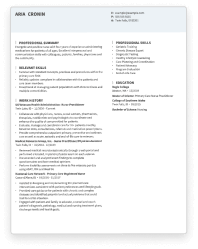
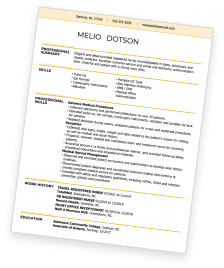
Save Time With Our Resume Builder
Key Takeaways
- Emphasize key skills like machine operation, patient monitoring, and effective communication.
- Highlight relevant certifications to validate your expertise.
- Tailor your resume to the specific dialysis role you’re applying for.
- Use industry-specific keywords for ATS optimization.
- Proofread your resume to make a good first impression.
Save Time With Our Cover Letter Builder
